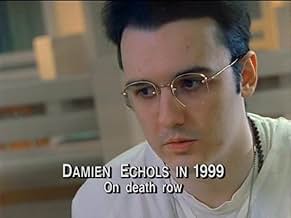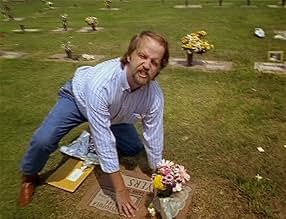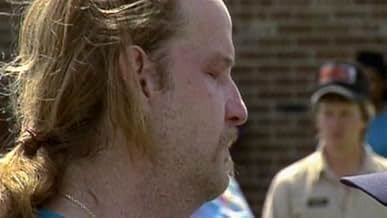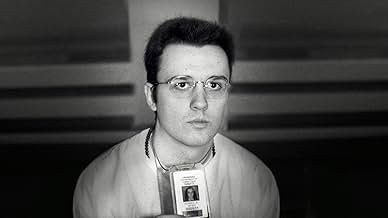CALIFICACIÓN DE IMDb
7.5/10
10 k
TU CALIFICACIÓN
Agrega una trama en tu idiomaThe case of the West Memphis Three, its questionable circumstances and the parties involved are followed up years later.The case of the West Memphis Three, its questionable circumstances and the parties involved are followed up years later.The case of the West Memphis Three, its questionable circumstances and the parties involved are followed up years later.
- Nominado a 1 premio Primetime Emmy
- 2 premios ganados y 1 nominación en total
Melissa Byers
- Self
- (material de archivo)
Tim Sullivan
- Self
- (archivo de sonido)
Jessie Misskelley
- Self
- (as Jessie Miskelly)
Opiniones destacadas
Generally riveting follow up of the case where three quite possibly innocent young men sit in prison for murdering three children.
Certainly, at least given what the two documentaries show, there is way beyond 'reasonable doubt' that they're responsible. But what was a moderate flaw in the first film becomes worse here; In the same way the prosecution disturbingly made the evidence fit their theory, throwing out, ignoring, or belittling what didn't fit, the film-makers seem to play some of the same game in reverse.
Crucial questions about alibis are never answered, and this sequel spends too much energy trying to pin guilt on Mark Byers, step-father of one of the murdered boys.
Is there some spooky circumstantial evidence that he may have been involved? Absolutely. But proof? The man even voluntarily takes a lie detector test, and passes with flying colors, which the film- makers then dismiss since the man is on various prescription mood altering drugs. But do we ever hear an expert say those drugs might affect the test? No.
More disturbing, the film seems to imply he's guilty because he looks and acts weird, and says confusing and contradictory things, the very sort of 'guilt by odd behavior' association both films attack in relation to the three boys found guilty. The fact that Byers (supposedly) has a brain tumor, and what effect that might have on his outward behavior is never explored at all. And watching this character at such length starts to get dull after a while, as his rants go on and on.
None-the-less, this is still a very interesting film, the most moving sections being those spent with the three now young men in jail for a crime they likely didn't commit. All have grown up a great deal in the 4 years since the last film, and are sad and articulate reminders of how horrifying it can be that people never given the benefit of a fair trial are allowed to sit and rot in prison. And the amazing lack of despair or bitterness they show is a testament to human resilience.
Certainly, at least given what the two documentaries show, there is way beyond 'reasonable doubt' that they're responsible. But what was a moderate flaw in the first film becomes worse here; In the same way the prosecution disturbingly made the evidence fit their theory, throwing out, ignoring, or belittling what didn't fit, the film-makers seem to play some of the same game in reverse.
Crucial questions about alibis are never answered, and this sequel spends too much energy trying to pin guilt on Mark Byers, step-father of one of the murdered boys.
Is there some spooky circumstantial evidence that he may have been involved? Absolutely. But proof? The man even voluntarily takes a lie detector test, and passes with flying colors, which the film- makers then dismiss since the man is on various prescription mood altering drugs. But do we ever hear an expert say those drugs might affect the test? No.
More disturbing, the film seems to imply he's guilty because he looks and acts weird, and says confusing and contradictory things, the very sort of 'guilt by odd behavior' association both films attack in relation to the three boys found guilty. The fact that Byers (supposedly) has a brain tumor, and what effect that might have on his outward behavior is never explored at all. And watching this character at such length starts to get dull after a while, as his rants go on and on.
None-the-less, this is still a very interesting film, the most moving sections being those spent with the three now young men in jail for a crime they likely didn't commit. All have grown up a great deal in the 4 years since the last film, and are sad and articulate reminders of how horrifying it can be that people never given the benefit of a fair trial are allowed to sit and rot in prison. And the amazing lack of despair or bitterness they show is a testament to human resilience.
Damien Echols, Jessie Misskelley, Jr., and Jason Baldwin were convicted in 1994 for the murder of three boys in West Memphis, Arkansas. It's 1999 and Damien has his final appeal in front of Judge David Burnett. The popularity of the original documentary has inspired support group, Free the West Memphis Three. Cameras are no longer allowed in the court. Of the victims' family, only John Mark Byers is cooperating with the filmmakers and he has a lot to say. He also has had a lot of legal problems. His wife died in 1996. He takes a lie detector test in front of the camera. The defense team seems to be concentrating on bite marks on the boys.
Byers is a big part of this follow-up. He's a very odd character and the movie is trying to make him suspicious. It's a lot of innuendos. Without being able to film the court proceedings, this is left without its main narrative. It becomes obviously one-sided. The support group adds very little to overwhelming need of this sequel. It needs to solve the murders or get the West Memphis Three out. This achieves neither. This could have been a shorter film to update the situation.
Byers is a big part of this follow-up. He's a very odd character and the movie is trying to make him suspicious. It's a lot of innuendos. Without being able to film the court proceedings, this is left without its main narrative. It becomes obviously one-sided. The support group adds very little to overwhelming need of this sequel. It needs to solve the murders or get the West Memphis Three out. This achieves neither. This could have been a shorter film to update the situation.
You can absolutely skip part 2 of paradise lost and just watch part 1 and 3.
They made a faux paus here where they focused their attention on a crazy guy that they tought was guilty and gave him way too much screen time. After watching part 3 this film feels inconsequential and a waste of time.
All of this is pretty funny considering the hypocracy of acusing someone of something with no evidence just because they are different, like the police and prosecuters did with Damien.
I gave parte 1 and 3 both 9/10, they were great and the Metallica music fits perfectly with the themes of these documentaries and it's connection to the kids.
They made a faux paus here where they focused their attention on a crazy guy that they tought was guilty and gave him way too much screen time. After watching part 3 this film feels inconsequential and a waste of time.
All of this is pretty funny considering the hypocracy of acusing someone of something with no evidence just because they are different, like the police and prosecuters did with Damien.
I gave parte 1 and 3 both 9/10, they were great and the Metallica music fits perfectly with the themes of these documentaries and it's connection to the kids.
But not for the right reasons.
The snickering, smug arrogance of the filmmakers, who seem to have more screen time than anyone actually involved in the case, made me see this documentary as just a vanity project. I couldnt even buy the patronizing solicitude they showed towards one defendant (undoubtedly because he is the most photogenic of the three convicted of the crime).
There is a definite travesty of justice here, but getting to the truth seems to have become secondary to the childish delight with which the filmmakers show how much smarter they are than anyone else.
Their hearts may indeed be in the right place, and they truly want to see justice served, but this kind of flagrant self-aggrandizment does not do justice to anyone.
The film offers no real evidence as to the identity of the "real" killer, beyond the filmmakers' own speculation and innuendo - which is precisely what convicted the three boys they are trying to "save" in the first place.
The snickering, smug arrogance of the filmmakers, who seem to have more screen time than anyone actually involved in the case, made me see this documentary as just a vanity project. I couldnt even buy the patronizing solicitude they showed towards one defendant (undoubtedly because he is the most photogenic of the three convicted of the crime).
There is a definite travesty of justice here, but getting to the truth seems to have become secondary to the childish delight with which the filmmakers show how much smarter they are than anyone else.
Their hearts may indeed be in the right place, and they truly want to see justice served, but this kind of flagrant self-aggrandizment does not do justice to anyone.
The film offers no real evidence as to the identity of the "real" killer, beyond the filmmakers' own speculation and innuendo - which is precisely what convicted the three boys they are trying to "save" in the first place.
The first film was so successful at causing doubt that a lot of restrictions were placed on this second film. Now only one parent of the murdered boys is willing to take part, no footage is allowed to be recorded in court, and the attorneys of two of the accused will not be interviewed. As such, this film has to struggle to find more things to detail, and also has less scope than the original. This film is mostly about saying that it could have been somebody else. They find reported teeth marks on one of bodies, which some experts argue aren't teeth marks and some say that they are. All this means is that how can we trust "experts" when they argue with each other. A lot of focus is placed on John Mark Byers. Here is a man that comes off as mentally unstable, has a violent and drug filled past, lies (or is at least very confused) about aspects of his life. How can you tell three different stories about how you lost your teeth? I mean really different stories. It's aggravating that somebody with such a poor grasp on reality cannot even consider the boys' innocence (I've read that now he does). His wife dies due to undetermined causes and still he is less of a subject than the three boys. Again, this film isn't about who did it, only that it may not have been these boys, and there is no real evidence to suggest that it was. I'm glad these guys are now out of jail, and hope Berlinger and others will continue their investigations to find the real killers, even if that just means finding proof that it was these boys.
¿Sabías que…?
- TriviaThe only film of the trilogy to be a TV project instead of receive a theatrical release.
- ErroresAt one point the on-screen date for a trial scene is listed as January of 1993. The murders didn't occur until May of that year.
- Bandas sonorasWelcome Home (Sanitarium)
Performed by Metallica
Written by James Hetfield, Lars Ulrich, and Kirk Hammett
Produced by Flemming Rasmussen with Metallica
Selecciones populares
Inicia sesión para calificar y agrega a la lista de videos para obtener recomendaciones personalizadas
Detalles
- Fecha de lanzamiento
- País de origen
- Idioma
- También se conoce como
- Revelations: Paradise Lost 2
- Locaciones de filmación
- Productoras
- Ver más créditos de la compañía en IMDbPro
- Tiempo de ejecución
- 2h 10min(130 min)
- Color
Contribuir a esta página
Sugiere una edición o agrega el contenido que falta























